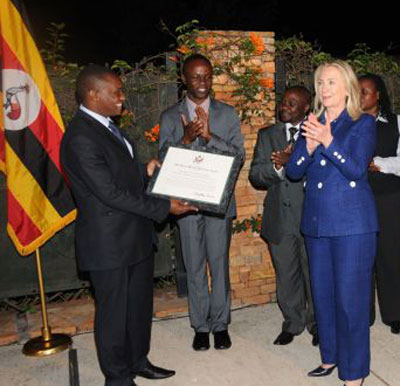New voice endorses U.S. support for LGBTI Africans
Colin Stewart is a 45-year journalism veteran living in Southern…

Another voice has joined the chorus of critics of the New York Times article of Dec. 20 that claimed “U.S. Support of Gay Rights in Africa May Have Done More Harm Than Good.”
“I read the article … with a lot of disbelief,” says Adrian Jjuuko, veteran Ugandan activist and executive director of the Uganda’s LGBTI-friendly legal organization, the Human Rights Awareness and Promotion Forum (HRAPF). The article described “a very different reality from what I as an activist … have experienced,” he says.
“The US support was always done in a respectful way and after consultations with activists on the ground,” Jjuuko writes in a letter to the editor of the New York Times.
In addition to Jjuuko, critics citing the Times article’s inaccuracies have included:
- Tom Malinowski, assistant secretary of the U.S. Department of State;
- Frank Mugisha, executive director of Sexual Minorities Uganda;
- Andrew Park, director of international programs at the Williams Institute in Los Angeles;
- Kikonyogo Kivumbi, who represents key HIV-affected populations on the Global Fund’s Uganda Country Coordinating Mechanism health policy panel;
- Nigeria’s Coalition for the Defense of Sexual Rights; and
- This blog, in its Dec. 24 article, “Nigerian activists protest harmful, flawed N.Y. Times coverage.”
Jjuuko has sent this letter to the editor of the New York Times, asking that it also be published:
The article on US support for gay rights in Africa did not reflect the Ugandan reality
I read the article ‘US support of gay rights in Africa may have done more harm than good’ with a lot of disbelief. This is because it spoke to a very different reality from what I, as an activist who has been in constant engagement with the US during the long fight against Uganda’s Anti-Homosexuality Bill (AHB), 2009, have experienced.
Though it was largely focused on Nigeria, the article also made general claims that purportedly apply to all of Africa and also specifically Uganda. Indeed, there were times when US support seemed to be ‘too much’ but this was
never in terms of funding but in terms of both the US government and US
organisations’ interest in what was going on. The real danger with this interest was that it would buy into the rhetoric that homosexuality was a Western import. It was however a trade off that had to be made, because we already had experienced what the opposite meant. The trade off was easy because homosexuality has for long been seen as a Western import in Uganda, and this will remain the prevalent view with or without US support.

The US support was always done in a respectful way and after consultations with activists on the ground. The few times when US officials spoke out publicly were those when we felt that that was the best course and advised US officials as such through regular guiding notes. Not once was action taken without the local activists being consulted, and we were always well aware of the risks.
One example that stood out is when US Secretary of State Hillary Clinton visited Uganda in 2012. She presented the Civil Society Coalition on Human Rights and Constitutional Law (CSCHRCL), with the US Human Rights Defenders Award 2011 in a very low-key ceremony that even never made it to the Ugandan press, in line with our suggestions. However, it meant a lot to us as recognising our efforts was a huge morale booster and made us stronger.
The ‘war against homosexuality’ in Uganda started long before active US support and would have continued regardless of US support. However, US support made a difference in that it empowered activists to stand up for their rights, and made the plight of LGBTI persons in Uganda visible. Violations against LGBTI persons were happening in Uganda before the US came in to support our work. They continue to happen, but now not with the same impunity as before, because we can stand up and challenge them on our own. This would have been difficult without US support.
Therefore far from doing harm, US support for gay rights in Africa greatly helped us to delay the AHB with all its provisions that would have made work like mine illegal and would virtually have criminalised the very existence of LGBTI persons. It also enabled activists to stand up for their rights; made the LGBTI movement in Uganda more visible and with visibility comes voice, and with voice comes protection.
Adrian Jjuuko, in addition to leading HRAPF, is a former coordinator and current chair of the Legal Committee of the Civil Society Coalition on Human Rights and Constitutional Law (CSCHRCL), which coordinates various Ugandan LGBTI groups’ battles seeking recognition of the human rights of LGBTI Ugandans.
Related articles
- N.Y. Times under continued attack for anti-LGBTI article (Dec. 29, 2015, 76crimes.com)
- Nigerian activists protest harmful, flawed N.Y. Times coverage (Dec. 24, 2015, 76crimes.com)
- “U.S. Support of Gay Rights in Africa May Have Done More Harm Than Good (Dec. 20, 2015, New York Times)
- Tortured in Gambia: LGBTI people, journalists, activists, clergy (September 2015, 76crimes.com)
- Human rights defenders urge respect for LGBTI Africans (May 2015, 76crimes.com)
- Goal: Boost safety, effectiveness of LGBTI rights defenders (September 2014, 76crimes.com)
- UNHCHR alarmed at LGBT arrests, detentions in Gambia (November 2014, 76crimes.com)
- African Commission backs LGBT rights (May 2014, 76crimes.com)



Reblogged this on Fairy JerBear's Queer/Trans News, Views & More From The City Different – Santa Fe, NM and commented:
A new voice on behalf of LGBTQIA Africans…